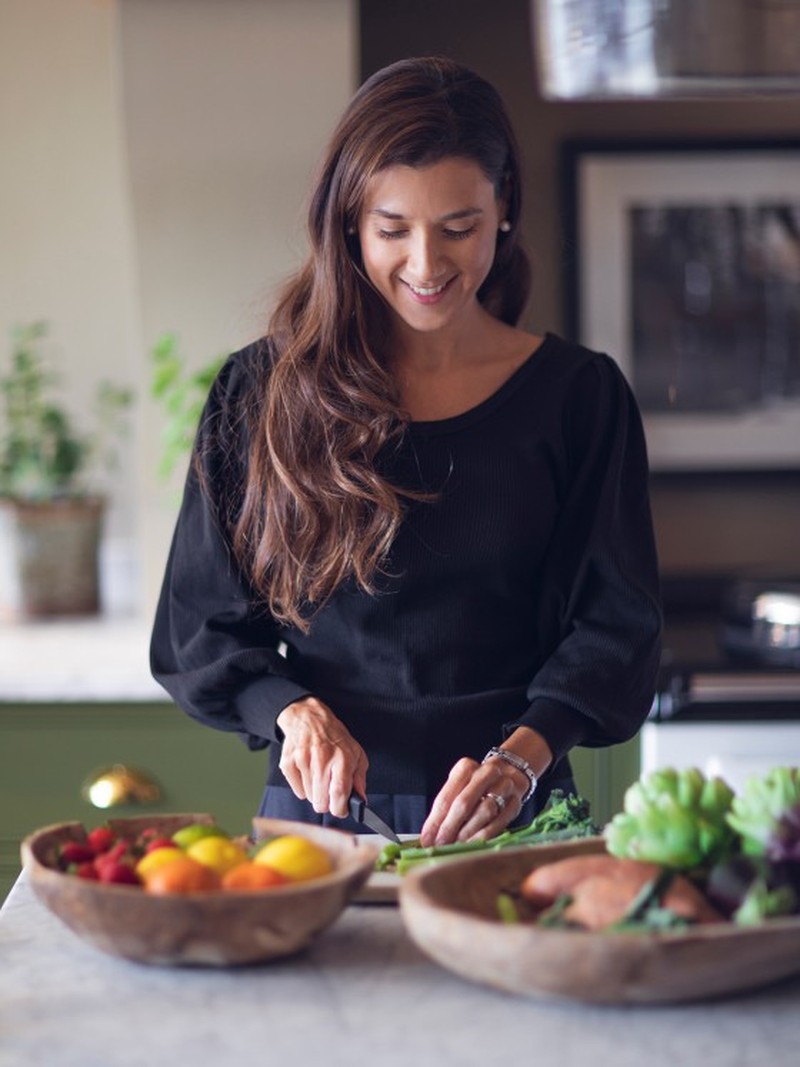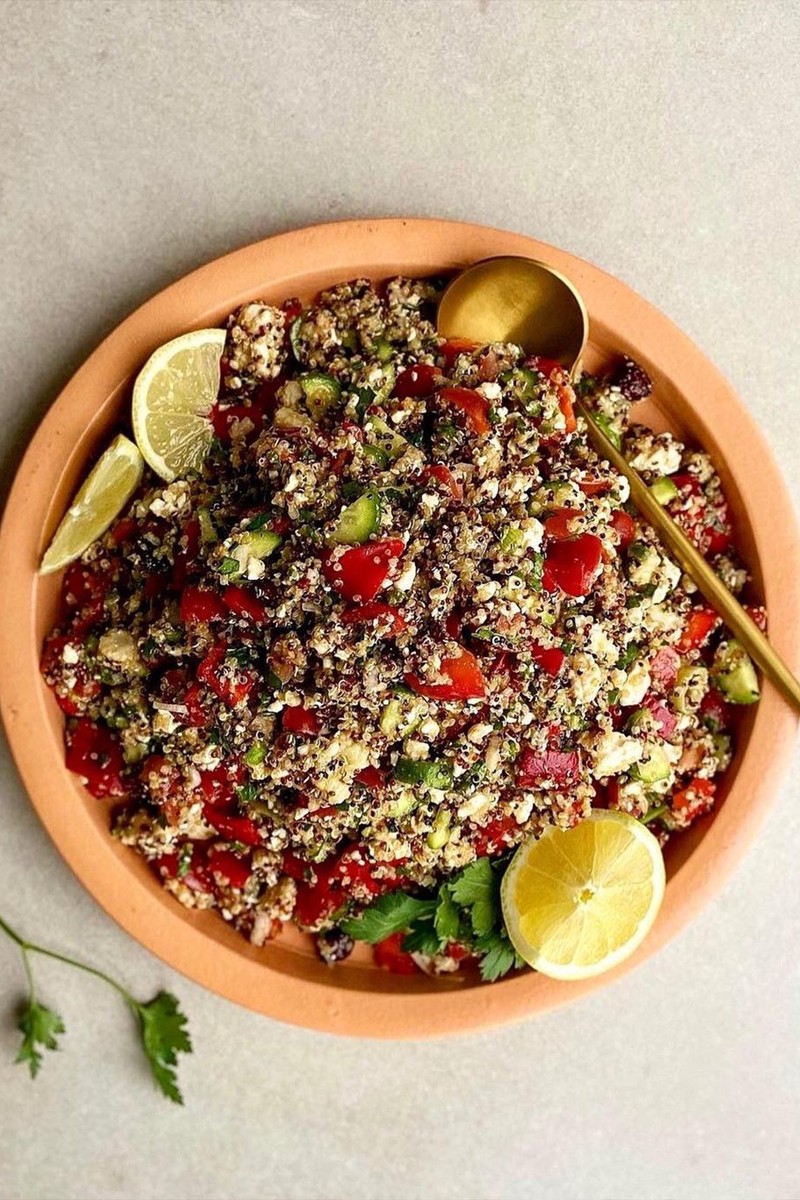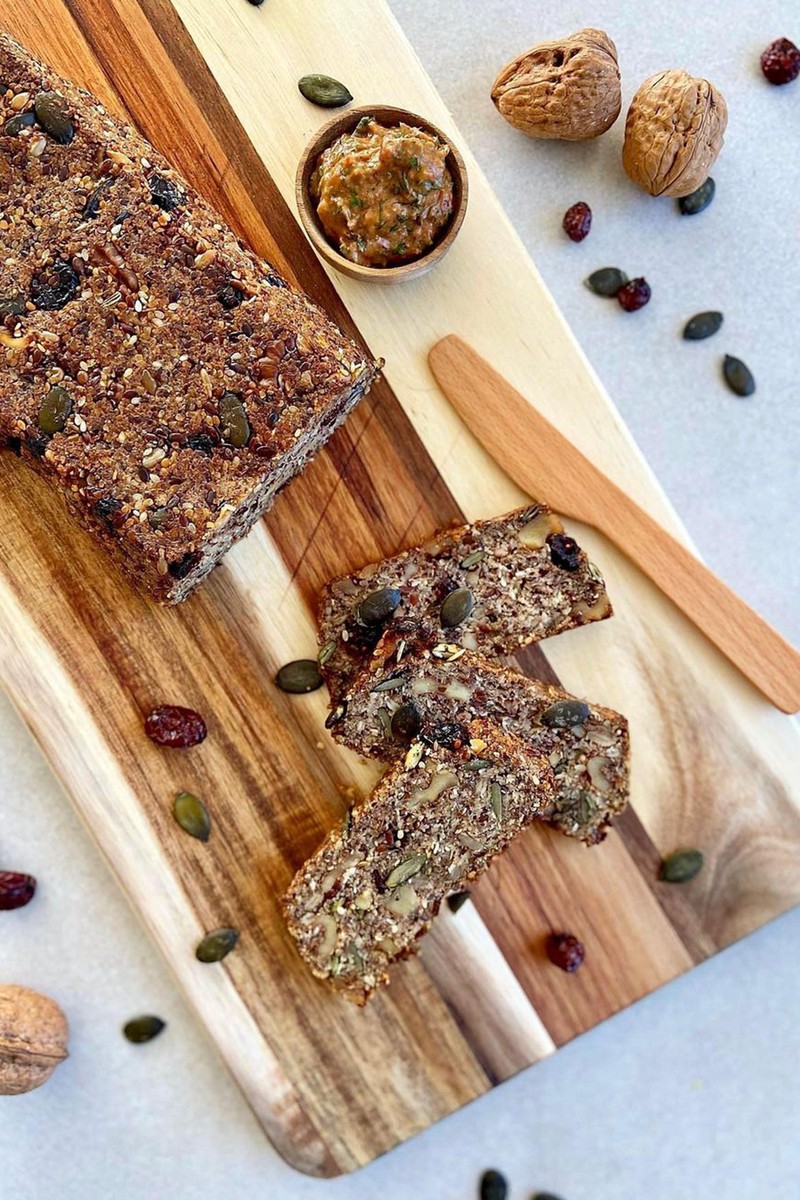An IBS Nutritionist Shares Her Food Diary
Hydration is essential first thing. Most of us wake up dehydrated, so after hours of sleep it’s important to rehydrate – water is essential to many bodily functions, including gut health. I slowly sip two to three glasses of water at room temperature as soon as I wake up. I’ll then have a cup of herbal tea – peppermint or ginger if my stomach is feeling delicate, or liquorice or milk thistle tea if I’ve been out the night before. I’m also a big fan of green tea – it’s full of polyphenols, which promote the growth of good gut bacteria and protect the gut barrier.
I wait until after breakfast to have my coffee. Drinking coffee on an empty stomach can raise stress hormones and lead to a glucose spike, so it’s best saved for later in the morning. If I fancy a second cup, I’ll make it decaf as it can take up to ten hours to metabolise caffeine, which is why it can affect sleep.
A savoury breakfast is my preferred choice. After fasting overnight, the first meal of the day sets the stage for balanced blood sugar, consistent energy and fewer sugar cravings, so a savoury, high-protein breakfast is the gold standard. My staple breakfast is an egg-white omelette with vegetables – I use Two Chick Organic Egg Whites to save time and always add healthy fats by including either avocado, cheese, nuts or a sprinkling of seeds. The combination of fibre, protein and fats keeps my energy stable throughout the morning.
Tofu scramble is a great vegan alternative. I crumble extra firm tofu in a frying pan with olive oil and season it with salt, pepper and turmeric. Once the tofu has browned, I add peeled tomatoes and cook everything for a few more minutes before topping it with goat’s cheese and fresh herbs. I serve it on a slice of gluten-free sourdough from The Bakery By Knife and Fork.
A low FODMAP diet can help ease gut symptoms. I developed IBS after an episode of food poisoning nearly 15 years ago. It’s not a well-known fact but catching a stomach bug is one of the most common causes of IBS. Today, I know my triggers and how to work around them, so I rarely experience a flare-up, but it does happen, especially when I’m eating out more. If this happens, I go back to the elimination phase of the low FODMAP diet until my symptoms reduce, and I prioritise cooked over raw foods because they are easier to digest. Spacing meals out also helps and cutting out snacking gives the digestive system time to do its job.
A protein smoothie will keep you going in the afternoon. Because I eat breakfast late I’m not always hungry at lunchtime, so I use my lunch break to go to the gym. I refuel with a protein smoothie afterwards – the secret to make it filling and gut-friendly is to pair protein with fibre and healthy fats. The combination I make on repeat is protein powder, frozen banana, oats, nut butter, chia and flaxseeds. My golden rule for optimal digestion is to never eat when I’m stressed, in a hurry, or right after a workout, so I wait until my nervous system is on rest-digest mode to drink it. On days when I need something more substantial, a tuna salad is my go-to lunch.
Granger & Co is a great lunch spot. I work from home and don’t often get to enjoy lunch out during the week, but when I do, it’s always Granger & Co. I always order the Fresh Aussie – poached eggs, greens, avocado and cherry tomatoes on toast. Cecconi’s is also lovely for a weekend treat – the burrata and sea bass are my favourite dishes on the menu. I haven’t eaten meat since childhood, so fish and eggs are my main sources of protein.
Supper is often a fish traybake. I eat a lot of white fish and salmon, and add seasonal vegetables like courgette, aubergine and tomatoes as well as plenty of herbs, olive oil, salt and pepper. I grew up eating a Mediterranean diet, so for me this type of dish is comforting and nourishing. Traybakes are a great way of eating quickly, simply and healthily. If I’m entertaining, I love to put together a grazing board. Not only is it a good way to include a variety of plant foods but it can look beautiful, too. I combine sources of carbohydrates, proteins and healthy fats to make sure it’s well balanced and no one leaves hungry – I make crudité skewers with celery, carrot, cucumber, peppers and radishes, and serve with two or three different dips, like hummus, baba ghanoush and guacamole, alongside fresh and dried fruit, seed crackers and smoked salmon.
Root vegetables are a source of prebiotic fibre. The likes of parsnips, sweet potatoes, carrots and butternut squash are all rich in antioxidants and a great source of dietary fibre to promote the growth of good gut bacteria. They’re my go-to source of complex carbohydrates. I’m currently obsessed with parsnips – I lightly steam them then coat in olive oil before roasting in the oven until brown and crispy.
Yoghurt is rich in healthy bacteria. I go through tubs of Yeo Valley organic Greek yoghurt every week, as well as Nush almond yoghurt and Coco’s Organic coconut yoghurt. I also love Plenish almond milk – it’s one of the only plant-based milks that doesn’t contain inflammatory oils, making it my top choice.
Packaged snacks can irritate the gut. I’m constantly on the hunt for new products to recommend to clients, but most snacks are either full of artificial sweeteners and emulsifiers that promote gut dysbiosis and inflammation or are made with dates and oats offering little to no protein. This is why I launched my own snack bar – Gutfulness – the UK’s first certified low-FODMAP protein bar, made with just five natural ingredients. Our protein requirements increase as we age, and from clinical experience I know most people struggle to eat enough protein. Each Gutfulness bar contains 10g of plant-based protein.
The darker the chocolate, the better. I believe that a little bit of what you fancy does you good. I love Ombar 90% cacao – it’s intense and packed with flavour – and Hu Hazelnut Butter.
Iron plays an important role in immunity. Keeping the immune system strong is a year-round job. Making good nutrition and lifestyle choices on a day-to-day basis is key to fighting viruses. The immune system needs a variety of nutrients to function properly, including iron and protein as well as vitamins A, C and D, zinc and selenium. If I’m feeling under the weather, I listen to my body and get as much rest as possible – this is essential for recovery. I will also be mindful of increasing my intake of these nutrients, and avoid alcohol and refined sugars, which suppress immunity.
If you do one thing differently, eat more colour. When it comes to gut health, diversity and abundance of good gut bacteria is what makes the gut microbiome robust. A study by the American Gut Project found that eating 30 different types of plants per week is associated with greater microbial diversity in the gut. This may sound like a lot, but it can be easily achieved if you eat a variety of fruits, vegetables, whole grains, legumes, nuts and seeds. Different varieties of the same vegetables count towards your weekly goal, so mix things up by choosing mixed salad leaves, mixed canned beans, rice pouches with more than one type of rice, a seed mix to top porridge and yoghurt; and get into the habit of buying different varieties of tomatoes, potatoes, pears and apples. Looking after your gut is easier than you think.
For more from Marilia or to book a consultation, visit GutfulnessNutrition.com. You can also follow Marilia on Instagram @GutfulnessNutrition.
DISCLAIMER: Features published by SheerLuxe are not intended to treat, diagnose, cure or prevent any disease. Always seek the advice of your GP or another qualified healthcare provider for any questions you have regarding a medical condition, and before undertaking any diet, exercise or other health-related programme.
DISCLAIMER: We endeavour to always credit the correct original source of every image we use. If you think a credit may be incorrect, please contact us at info@sheerluxe.com.




